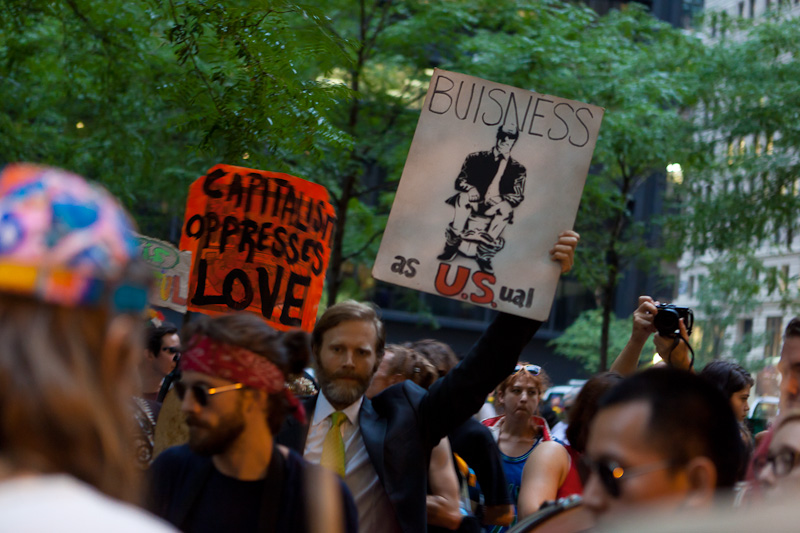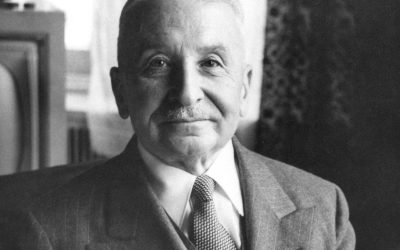An excerpt from Chapter 1 of Capitalism: A Treatise on Economics, Volume I.
In propounding sound economic theory and thus in presenting the case for capitalism, this book cannot avoid being highly controversial. It is necessary to explain the reasons.
The Assault on Economic Activity and Capitalism
Virtually every aspect of capitalism and thus of economic activity is savagely denounced by large segments of public opinion. The pursuit of self-interest is condemned as evil, and of material self-interest as “vulgar” besides. Freedom under capitalism is ridiculed as “the freedom to starve” and as “wage slavery.” Private property is condemned as theft—from a patrimony allegedly given by God or Nature to the human race as a whole. Money is denounced as the “root of all evil”; and the division of labor, as the cause of one-sided development, narrowness, and “alienation.”
The profit motive is attacked as the cause of starvation wages, exhausting hours, sweatshops, and child labor; and of monopolies, inflation, depressions, wars, imperialism, and racism. It is also blamed for poisoned foods, dangerous drugs and automobiles, unsafe buildings and work places, “planned obsolescence,” pornography, prostitution, alcoholism, narcotics abuse, and crime. Saving is condemned as hoarding; competition, as “the law of the jungle”; and economic inequality, as the basis of “class warfare.” The price system and the harmony of interests are almost completely unheard of, while economic progress is held to be a “ravaging of the planet,” and, in the form of improvements in efficiency, a cause of unemployment and depressions. At the same time, by the same logic, wars and destruction are regarded as necessary to prevent unemployment under capitalism.
Virtually all economic activity beyond that of manual labor employed in the direct production of goods is widely perceived as parasitical. Thus businessmen and capitalists are denounced as recipients of “unearned income,” and as “exploiters.” The stock and commodity markets are denounced as “gambling casinos”; retailers and wholesalers, as “middlemen,” having no function but that of adding “markups” to the prices charged by farmers and manufacturers; and advertisers, as inherently guilty of fraud—the fraud of attempting to induce people to desire the goods that capitalism showers on them, but that they allegedly have no natural or legitimate basis for desiring.
Despite the obvious self-contradictions, capitalism is simultaneously denounced for impoverishing the masses and for providing them with “affluence,” for being a rigid class society and for being dominated by the upstart nouveau riche, for its competition and for its lack of competition, for its militarism and for its pacifism, for its atheism and for its support of religion, for its oppression of women and for its destruction of the family by making women financially independent.
Overall, capitalism is denounced as “an anarchy of production,” a chaos ruled by “exploiters,” “robber barons,” and “profiteers,” who “coldly,” “calculatingly,” “heartlessly,” and “greedily” consume the efforts and destroy the lives of the broad masses of average, innocent people.
On the basis of all these mistaken beliefs, people turn to the government: for “social justice”; for protection and aid, in the form of labor and social legislation; for reason and order, in the form of government “planning.” They demand and for the most part have long ago obtained: progressive income and inheritance taxation; minimum-wage and maximum-hours laws; laws giving special privileges and immunities to labor unions; antitrust legislation; social security legislation; public education; public housing; socialized medicine; nationalized or municipalized post offices, utilities, railroads, subways, and bus lines; subsidies for farmers, shippers, manufacturers, borrowers, lenders, the unemployed, students, tenants, and the needy and allegedly needy of every description. They have demanded and obtained food and drug regulations, building codes and zoning laws, occupational health and safety legislation, and more. They have demanded and obtained the creation of additional money, and the abolition of every vestige of the gold standard—to make possible the inflation of the money supply without limit. They have demanded this last in the belief that the additional spending the additional money makes possible is the means of maintaining or achieving full employment, and in the belief that creating money is a means of creating capital for lending and thus of reducing interest rates. The ability to create money has also been demanded because it is vital in enabling additional government expenditures to be financed by means of budget deficits and thus in fostering the delusion that the government can provide benefits for which the citizens do not pay. And when, as is inevitable, the policy of inflation results in rising prices, capital decumulation, and the destruction of credit, people demand price and wage controls, and then, in response to the shortages and chaos that result, the government’s total control over the economic system, in the form of rationing and allocations.
In the face of such ideas and demands, which have swept over the country with the force of a great flood, traditional American values of individual rights and limited government have appeared trivial and antiquated—appropriate perhaps to an age of independent farmers, but by no means to be permitted to stand in the way of what a frightened and angry mass of people perceive as the requirements virtually of their self-preservation. Indeed, so complete has been the destruction of traditional American values, that the concept of individual rights has itself been made over into a vehicle serving demands for government subsidies and extensions of government power—in such forms as the assertion of “rights” to jobs, housing, education, pensions, medical care, and so on.
This book flies in the face of all such anticapitalistic ideas and demands. Its thesis implies that never have so many people been so ignorant and confused about a subject so important, as most people now are about economics and capitalism. It shows that in its logically consistent form of laissez-faire capitalism—that is, with the powers of government limited to those of national defense and the administration of justice—capitalism is a system of economic progress and prosperity for all, and is a precondition of world peace.
The Prevailing Prescientific Worldview in the Realm of Economics
There are a number of mutually reinforcing reasons for the prevailing mass of errors about economics and capitalism.
First, even though this is the late twentieth century, it is no exaggeration to say that in the realm of economics, the thought of most people continues to bear the essential characteristics of the mentality of the Dark Ages or of primitive peoples in general. What I mean by this is that prior to the development of a scientific worldview in the Renaissance, it was common for people even in Western Europe to interpret natural phenomena as the result of the operation of good or evil spirits. Thus, if a flood came and washed away their huts, or if their animals died of disease, polytheistic primitive peoples would think the explanation lay in the anger of a river god or some other deity. Similarly, the supposedly monotheistic Europeans of the Dark Ages would believe the explanation lay in the curse of some witch or other evil spirit. Both believed that their protection from such harm lay in securing the aid of a more powerful benevolent spirit, whether another deity or an angel, or simply the one and only deity. What was essential was that they believed that their harm resulted from the exercise of arbitrary power by evil forces and that their security depended on obtaining the aid of a greater, stronger arbitrary power who would act on their behalf.
As the preceding discussion of the assault on economic activity and capitalism should make clear, this is precisely the worldview people continue to apply in the present day in the realm of economics. Again and again they view their economic harm as caused by the ill will of an arbitrary power—above all, “big business.” And they believe that their protection depends on the good will of a bigger, tougher, stronger arbitrary power—namely, the government—which will act on their behalf. If, for example, the level of wages or prices or the quantity or quality of housing, medical care, education, or anything else is not to people’s satisfaction, the explanation, they believe, is that evil businessmen are responsible. The solution, they believe, is for the government, which is more powerful than the businessmen, to use its greater power on behalf of the people.41
In contrast, the view of the economic world imparted by economic science is as far removed from that of the primitive mentality as is the view of the physical world that is imparted by the sciences of physics and chemistry. The worldview imparted by economics is, like that of physics and chemistry, one of operation according to natural laws which can be grasped by human intelligence. The domain of the natural laws of economics is, of course, that of the rationally self-interested actions of individuals insofar as they take place under freedom and center on the production of wealth under a division of labor.
This scientific view of economic phenomena, even though in existence since the late eighteenth century in the writings of the Physiocrats and the early British classical economists, has been prevented from replacing the primitive worldview. It has been prevented by the combined operation of the factors explained in the remainder of this section.
Economics Versus Unscientific Personal Observations
Everyone is a participant in economic activity and as such develops or accepts opinions about economic life that seem consistent with his own observations of it. Yet those opinions are often mistaken, because they rest on too narrow a range of experience, which renders them inconsistent with other aspects of experience of the same subject. Examples of this phenomenon in the everyday world of physical reality are such naive beliefs as that sticks bend in water, that the earth is flat, and that the sun revolves around the earth. In contrast with such naďveté, a scientific process of thought seeks to develop the theory of a subject based on logical consistency with all the valid observations pertaining to it. Thus, the visual appearance of sticks being bent in water is reconciled with the fact that they continue to feel straight when subjected to touch; the reconciliation being by knowledge of the refraction of light caused by water. The earth’s appearance of flatness is reconciled with such observations as the masts of ships first becoming visible on the horizon by knowledge of the very gradual curvature of the earth. The appearance of the sun’s revolution about the earth is reconciled with knowledge of the sun’s relationship to other observable heavenly bodies through knowledge of the earth’s rotation about its axis.
Economics suffers from an apparent conflict between personal observation and scientific truth probably to a greater extent than most other sciences. This is because of the very nature of the system of division of labor and monetary exchange. Every participant in the economic system is a specialist, aware of the effect of things on his own specialization. As a rule, he does not stop to consider their effect on other specializations as well; nor, as a rule, does he consider what their longer-run effect on him might be were he to change his specialization. As a result of this, people have come to believe such things as that improvements in production, which can in fact necessitate the shrinkage or total disappearance of employment in any particular branch of the division of labor, are economically harmful. By the same token, they have come to believe that acts of destruction, which can in fact result in an expansion of employment in particular branches of the division of labor, are economically beneficial.42
Closely related to the failure to look beyond one’s own current specialization is the widespread confusion between money and wealth. In a division-of-labor economy everyone is naturally interested in earning money and comes to measure his economic well-being by the amount of money he earns. Thus, it is extremely easy for people to conclude that anything that enables the average person to earn more money is desirable, while anything that results in the average person’s earning less money is undesirable. It takes a scientific analysis to show that while each individual is always economically best off earning as much money as the freedom of competition allows him to earn, people are not economically better off when average earnings increase as the result of government policies of creating money, or because the government violates the freedom of competition. Indeed, economics shows that lower monetary earnings without money creation and without violations of the freedom of competition represent a higher actual standard of living than do higher monetary earnings with them.43 Along these lines, there are important cases in which, even in the absence of money creation, it turns out that a lower “national income” or “gross national product” signifies a more rapid rate of increase in the production of wealth and improvement in human well-being than does a higher “national income” or “gross national product.”44
Excerpted from Chapter 1 of Capitalism: A Treatise on Economics, Volume I. Copyright 2020 George Reisman. All rights reserved. The encyclopedic Capitalism: A Treatise on Economics is a required reference for every Capitalist’s library. Reisman’s treatise is now available in two volumes: Volume I (focuses on microeconomic issues) and Volume II (focuses on macroeconomic issues).
References
41. The leading manifestation of this worldview is the Marxian exploitation theory and the “liberal” political agenda that rests on it. See below, pp. 603-604.
42. The nature of these fallacies, along with most of their leading manifestations, has been brilliantly dissected by Henry Hazlitt, Economics in One Lesson, new ed. (New Rochelle, N. Y.: Arlington House Publishers, 1979), and by Frederic Bastiat in his Economic Sophisms, trans. Arthur Goddard (New York: D. Van Nostrand, 1964).
43. See below, pp. 618-663, 930-937.
44. On this subject see below, pp. 712-714.




